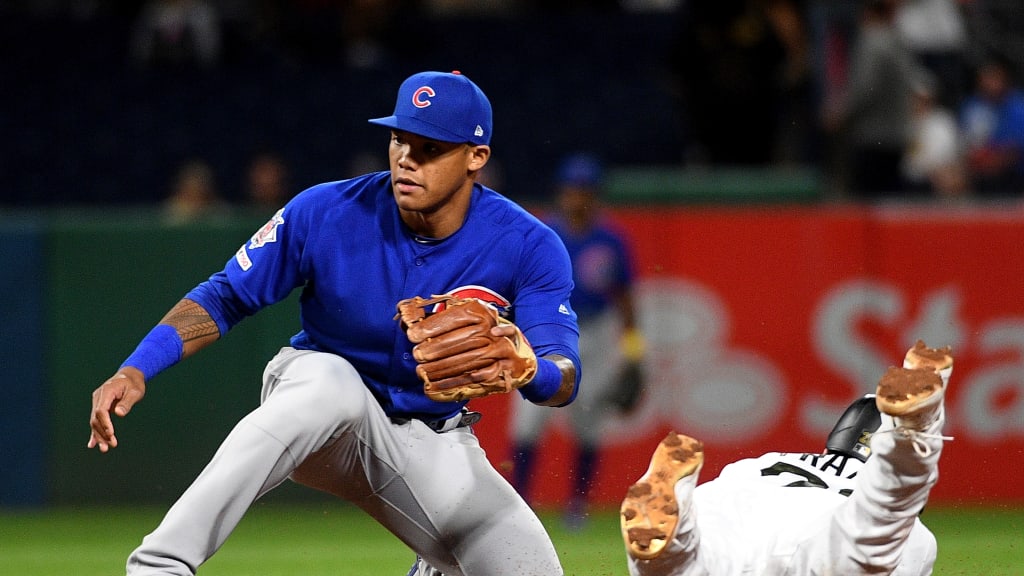
CHICAGO -- Addison Russell was once a key component of the Cubs' core that ended the franchise's long, historic World Series drought. Following three subpar seasons that included off-field issues, Chicago has elected to part ways with the infielder.
On Monday night, the Cubs opted not to tender Russell a contract for 2020, sending the former All-Star shortstop into the free-agent pool. Russell earned a base salary of $3.4 million last winter after avoiding arbitration, but then endured a rough season on the field following the conclusion of a 40-game suspension for violating MLB's Domestic Violence Policy.
"We decided to non-tender Addison Russell today," Cubs president of baseball operations Theo Epstein said in a statement, "simply because the role we expected him to play for the 2020 Cubs was inconsistent with how he would have been treated in the salary arbitration process."
Not surprisingly, the Cubs tendered contracts to outfielder Albert Almora Jr., shortstop Javier Báez, third baseman Kris Bryant, catcher Willson Contreras, lefty Kyle Ryan and outfielder Kyle Schwarber prior to Monday's deadline. Those paperwork moves by the Cubs initiate the arbitration process with that group of players.
The Cubs also signed righty Jharel Cotton to a one-year, $640,000 non-guaranteed contract to avoid arbitration. Chicago acquired Cotton from the A's in exchange for cash considerations on Nov. 23 as a low-risk, high-reward candidate for the pitching staff. Coming off two injury-marred seasons, Cotton has one Minor League option remaining.
The Cubs also non-tendered lefty Danny Hultzen, the second overall pick by the Mariners in 2011 who finally found his way to the Majors as a reliever with Chicago in September last season.
The six players tendered contracts will be eligible to file for arbitration in January, with Jan. 10 serving as the deadline for anyone still unsigned to exchange proposed salary figures with the Cubs. The sides can strike a deal at any point leading up to a player's scheduled arbitration hearing (between Feb. 3-21) and are not limited to just signing one-year pacts.
Báez, Bryant and Schwarber are currently on pace to hit free agency after '21, with Contreras following suit in '22. The Sun-Times reported earlier this offseason that the Cubs are in the beginning stages of extension talks with Báez. Expect Chicago to also explore that possibility with Bryant and his agent, Scott Boras, as the sides navigate negotiations in the arbitration period.
If the Cubs are unable to reach extensions with any of those players -- as the club not only plans for '20, but for the next several seasons -- it is also possible that the North Siders gauge what kind of return might exist via the trade market. At the end of last season, Epstein hinted at that scenario, noting that the team had to be "very open-minded" this winter.
Under Epstein, who joined the Cubs' front office prior to the 2012 campaign, Chicago has only gone to an arbitration hearing once. The Cubs won that case, against pitcher Justin Grimm in '18. Typically, the Cubs have taken a file-or-trial approach, meaning a case will go before an arbitration panel if the sides are unable to reach a deal by the exchange deadline.
A year ago, the Cubs opted to give Russell a contract ($3.4 million base salary plus incentives) and an opportunity to stay with the organization while going a personal protocol set forth by the team in light of his suspension and off-field actions. The Cubs also took steps behind the scenes with all of their employees, front-office staffers, coaches, players and in the community to address the issue of domestic violence on a broader scale.
"In the year since we decided to tender Addison a contract last November," Epstein said, "he has lived up to his promise to put in the important self-improvement work necessary off the field and has shown growth as a person, as a partner, as a parent and as a citizen. We hope and believe that Addison’s work and growth will continue, and we have offered our continued support of him and his family, including [his ex-wife] Melisa.
"In the last year, the organization has also put in the important work necessary to bolster our domestic violence prevention training for all employees, all major league players, all minor league players and all staff. We also offered healthy relationship workshops for the players’ partners and provided intensive, expert domestic violence prevention training for player-facing staff. This heightened training and our increased community involvement on the urgent issue of domestic violence prevention will continue indefinitely."
While Russell's situation was undoubtedly a distraction for the team last season, Monday's decision came down to production.
In 82 games last season, Russell batted .237/.308/.391 with nine home runs, 23 RBIs and a 79 OPS+ (21 percent below MLB average as a hitter). With Báez entrenched at shortstop, Russell moved to second base and was in the red for Defensive Runs Saved (minus one) with a 6.3 UZR/150. In limited action at short, he had a minus 8.9 UZR/150.
Russell had 21 homers, 95 RBIs and a 94 OPS+, while playing elite defense at shortstop, in his lone All-Star campaign in '16. In the postseason that year, he made his mark on the Cubs' history books with a grand slam and six RBIs in Game 6 of the World Series against Cleveland. Over the past three years, however, Russell has turned in an 80 OPS+ in 322 games.
As things currently stand, Báez projects to be back at shortstop for the Cubs in '20, and potentially for years to come if he pens his name on a contract extension. For second, Chicago has a long list of internal options at the moment. Top prospect Nico Hoerner is one of the candidates for second, along with David Bote, Daniel Descalso, Ian Happ, Tony Kemp and Robel Garcia.


